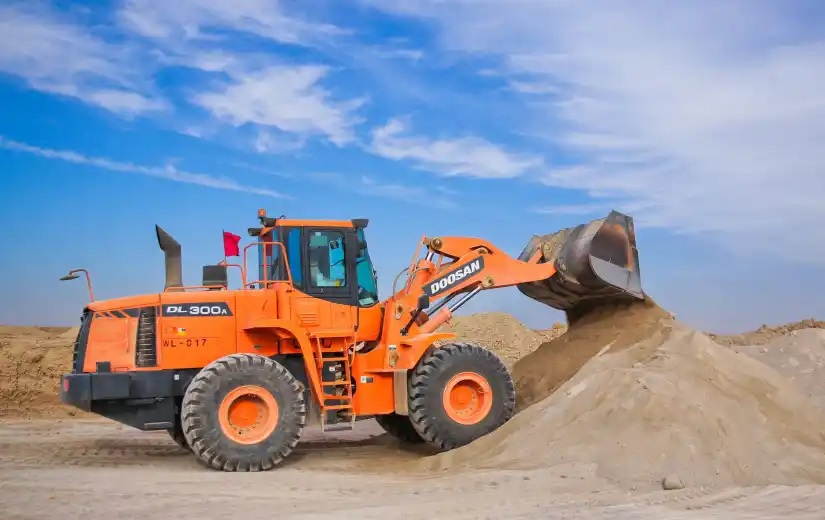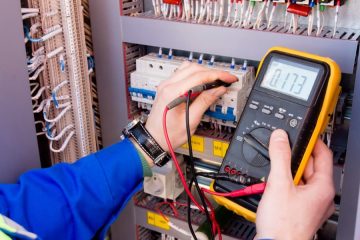The Essential Guide to Earthmoving Equipment Rental: Everything You Need to Know

Key Takeaways:
- The world of earthmoving equipment has a rich history spanning thousands of years, with early innovators using simple tools and techniques.
- The invention of the wheel revolutionized earthmoving, and the domestication of animals introduced animal power for tasks.
- Modern earthmoving equipment saw advancements in machinery, technology, and the introduction of hydraulic systems.
- When selecting equipment, consider the size and scope of your project, specific tasks and conditions, and your budget and timeframe.
- Renting earthmoving equipment offers cost savings, access to the latest technology, and flexibility to upgrade or downsize as needed.
- Rental companies provide expert support, maintenance services, technical assistance, and minimize downtime with backup machines.
- Choose a reliable rental company with experience, well-maintained machinery, and flexible rental terms and conditions.
- Thoroughly understand rental agreements, negotiate terms if needed, ensure adequate insurance coverage, and be aware of additional fees and charges.
The History of Earthmoving Equipment
The world of earthmoving equipment has come a long way, with a rich history spanning thousands of years. Understanding the roots of earthmoving can give us a deeper appreciation for the advanced machinery we have today.
The Early Innovations in Earthmoving
The earliest forms of earthmoving involved simple tools and techniques utilized by ancient civilizations. These early innovators used basic tools like shovels, picks, and hand-moved carts to move earth and construct structures.
Ancient Tools and Techniques
Ancient civilizations, such as the Egyptians and Mesopotamians, employed human labor and simple manual tools to dig canals, level land for agriculture, and build structures. These early tools were often made of wood, stone, or bronze.
The Invention of the Wheel
The invention of the wheel revolutionized the way people moved heavy objects and shaped the future of earthmoving. The wheel allowed for easier transportation of materials, leading to the development of more efficient earthmoving techniques.
The Introduction of Animal Power
With the domestication of animals, humans began utilizing animal power for earthmoving tasks. Oxen, horses, and other animals were harnessed to pull carts and plows, greatly increasing the productivity and scale of earthmoving projects.
The Development of Modern Earthmoving Equipment
As civilizations advanced and industrialization took hold, the progress of earthmoving equipment accelerated. Innovations in machinery and technology transformed earthmoving into a more efficient and productive industry.
From Steam-Powered to Diesel-Powered Machinery
In the 19th century, steam-powered engines were introduced to earthmoving equipment, allowing for more power and increased productivity. However, it wasn’t until the development of the internal combustion engine in the early 20th century that diesel-powered machinery became prevalent.
The Rise of Hydraulic Technology
The use of hydraulic systems revolutionized earthmoving equipment by providing more precise control and increased lifting capabilities. Hydraulic excavators and bulldozers became staples in the industry, improving efficiency and versatility.
The Evolution of Excavators and Bulldozers
Over time, excavators and bulldozers underwent significant advancements to enhance their capabilities. These machines became more maneuverable, powerful, and equipped with a range of attachments for various earthmoving tasks.
Choosing the Right Earthmoving Equipment for Your Project
When embarking on an earthmoving project, selecting the appropriate equipment is crucial for its success. Understanding the different types of earthmoving equipment and considering key factors can help you make an informed decision.
Understanding Different Types of Earthmoving Equipment
Earthmoving equipment comes in various forms, each designed for specific tasks and terrains. Familiarizing yourself with the different types can ensure you choose the most suitable equipment for your project.
Excavators: Versatile Machines for Digging and Excavating
Excavators are versatile machines equipped with a bucket and an arm that can rotate 360 degrees. They are ideal for digging trenches, foundations, and removing debris. Their range of attachments, such as breakers and grapples, allows for various applications.
Bulldozers: Powerful Machines for Pushing and Shaping Earth
Bulldozers are known for their pushing power and ability to shape terrain. They have a large blade at the front that can push soil, rocks, and debris. Bulldozers are commonly used for grading land, clearing vegetation, and creating roads.
Backhoe Loaders: Efficient Machines for Digging and Loading
Backhoe loaders combine the capabilities of excavators and loaders. They have a digging bucket on the back and a loader bucket on the front. Backhoe loaders are suitable for various tasks, including digging, loading, and lifting materials.
Factors to Consider When Selecting Equipment
Choosing the right earthmoving equipment involves evaluating several factors that can impact the efficiency and cost-effectiveness of your project. Taking these factors into account will ensure you make an informed decision.
The Size and Scope of Your Project
The scale and complexity of your project should dictate the size and capabilities of the equipment you choose. Larger projects may require more powerful machinery, while smaller projects may benefit from compact and maneuverable equipment.
The Specific Tasks and Conditions
Consider the specific tasks you need to accomplish and the environmental conditions of the project site. For example, if you are working in tight spaces, a compact excavator might be more suitable than a larger one.
Your Budget and Timeframe
Evaluate your budget and the duration of your project. Renting equipment can be a cost-effective option for short-term projects, while purchasing may be more beneficial for long-term or recurring projects.
The Benefits of Renting Earthmoving Equipment
When it comes to earthmoving equipment, renting offers several advantages over purchasing. Understanding the benefits of renting can help you make an informed decision and maximize the efficiency of your project.
Cost Savings and Flexibility
One of the primary benefits of renting earthmoving equipment is cost savings. Choosing to rent eliminates the upfront costs of purchasing machinery and eliminates the need for ongoing maintenance and storage expenses.
Avoiding the High Cost of Equipment Ownership
Earthmoving equipment can be expensive to purchase and maintain. By renting, you can bypass these costs and allocate your budget to other critical areas of your project.
Access to the Latest Technology
Rental companies often provide access to the latest equipment models and technologies. This allows you to take advantage of advancements in efficiency, fuel consumption, and productivity without the commitment of purchasing.
Flexibility to Upgrade or Downsize as Needed
As the needs of your project change, renting enables you to easily upgrade or downsize your equipment. This flexibility ensures that you always have the right machinery for the job, eliminating the need to invest in equipment you may not use in the future.
Expert Support and Maintenance
When renting earthmoving equipment, you gain access to professional support and maintenance services. This can save you time and reduce the risk of downtime due to equipment malfunctions or breakdowns.
Ongoing Equipment Maintenance and Repairs
Rental companies typically handle routine maintenance and repairs on their equipment, ensuring that you always have reliable and well-functioning machinery. This takes the burden off your shoulders and allows you to focus on the project at hand.
Technical Assistance and Training
Many rental companies offer technical assistance and training to ensure that you can operate the equipment safely and efficiently. This can be particularly valuable if you are unfamiliar with specific models or new technology.
Minimizing Downtime with Backup Machines
In the event of unexpected equipment failures or breakdowns, rental companies can provide backup machines to minimize downtime. This ensures that your project stays on schedule and avoids costly delays.
Tips for Renting Earthmoving Equipment
When renting earthmoving equipment, there are several key considerations and best practices to keep in mind. Following these tips can help you navigate the rental process and ensure a successful project.
Choosing a Reliable Equipment Rental Company
Selecting a reputable rental company is critical to the success of your project. Consider the following factors when choosing a rental provider:
Experience and Expertise in Earthmoving Equipment
Look for a rental company with a proven track record and extensive experience in providing earthmoving equipment. They should have a deep understanding of the industry and the specific needs of your project.
Well-Maintained and Up-to-Date Machinery
Ensure that the rental company properly maintains their equipment and keeps it up-to-date. Well-maintained machinery is less likely to experience breakdowns, resulting in reduced downtime for your project.
Flexible Rental Terms and Conditions
Consider the rental terms and conditions offered by the company. Look for flexibility in terms of rental duration, extensions, and any penalties or fees associated with changes to your agreement.
Understanding Rental Agreements and Insurance
Before signing a rental agreement, it’s essential to thoroughly understand the terms and conditions. Pay close attention to the following aspects:
Reading and Negotiating the Terms and Conditions
Take the time to read and fully comprehend the rental agreement. If there are any terms or conditions that you are uncertain about or would like to negotiate, communicate your concerns with the rental company before finalizing the rental.
Insurance Coverage for Damage and Liability
Ensure that the rental agreement includes adequate insurance coverage for both equipment damage and liability. This protects you from unforeseen accidents or incidents that may occur during the rental period.
Additional Fees and Charges to Consider
Be aware of any additional fees or charges that may be associated with the rental. These can include delivery fees, fuel charges, or penalties for exceeding the agreed-upon rental duration.
In conclusion, understanding the history, types, and benefits of earthmoving equipment rental can greatly assist you in making informed decisions for your projects. By considering the specific needs of your project, evaluating your budget and timeframe, and choosing a reliable rental company, you can streamline your earthmoving operations and maximize efficiency. Remember to thoroughly review rental agreements, insurance coverage, and any additional fees before finalizing your rental. With the right equipment and support, your earthmoving projects will be executed smoothly, delivering impressive results.
FAQ
Question: What are the advantages of renting earthmoving equipment? – Renting earthmoving equipment offers cost savings, access to the latest technology, and flexibility to upgrade or downsize as needed.
Question: What support services can rental companies provide? – Rental companies provide expert support, maintenance services, technical assistance, and minimize downtime with backup machines.
Question: How do I choose the right earthmoving equipment for my project? – When selecting equipment, consider the size and scope of your project, specific tasks and conditions, and your budget and timeframe.
Question: What types of earthmoving equipment are available? – Earthmoving equipment includes excavators, bulldozers, and backhoe loaders, each designed for specific tasks and terrains.
Question: How can renting earthmoving equipment save me money? – Renting eliminates upfront costs of purchasing machinery and eliminates ongoing maintenance and storage expenses.
Question: What support and maintenance services do rental companies provide? – Rental companies handle routine maintenance and repairs, offer technical assistance and training, and provide backup machines to minimize downtime.
Question: What should I consider when choosing a rental company? – Look for experience and expertise in earthmoving equipment, well-maintained machinery, and flexible rental terms and conditions.
Question: What should I be aware of when signing a rental agreement? – Thoroughly understand rental agreements, negotiate terms if needed, ensure adequate insurance coverage, and be aware of additional fees and charges.
Useful Resources:
- com – Learn more about the history of earthmoving equipment.
- Caterpillar – Explore different types of earthmoving equipment and their capabilities.
- Komatsu America – Access information on advanced machinery and technology in earthmoving.
- Volvo Construction Equipment – Find resources on hydraulic systems and their impact on earthmoving.
- RentalHQ – Discover the benefits of renting earthmoving equipment and find reputable rental companies.
- United Rentals – Learn about expert support, maintenance services, and technical assistance provided by rental companies.
- Construction Equipment Guide – Stay updated on industry news and advancements in earthmoving equipment.
- Sunbelt Rentals – Gain insights into choosing the right equipment for your project and understanding rental agreements.











